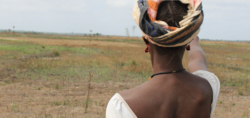SwedWatch | 8 November 2017
Swedfund, FMO failed to respect human rights when exiting bioenergy project
Swedfund, FMO failed to respect human rights when exiting bioenergy project
When land-related projects fail or stall, local communities are often left with little to rely on and face severe human rights risks. Despite this, such risks are rarely addressed by investors. In a new report ”No business, no rights” Swedwatch shows how local communities were affected when the Addax Bioenergy project in Sierra Leone stalled. The report also highlights the effect of development finance institutions (DFIs) Swedfund and FMO’s exit from the project when no steps were taken to ensure that the rights of local communities were respected.
In 2011, Swedish and Dutch development finance institutions (DFIs) Swedfund and FMO became minority shareholders of Addax Bioenergy in Sierra Leone. The project represented the biggest agriculture investment ever undertaken in the country and had a high sustainability profile. Addax’s business plan was to grow sugarcane to produce ethanol for the European market, and to use the waste product bagasse to generate electricity for the national power grid. The sugar cane plantations were developed on land leased by local communities, of which a majority were subsistence farmers entirely depending on land for their livelihood. When the project started, many of them were employed by Addax.
To secure access to food in affected communities, a food security support program was set up whereby Addax, for a three-year period, cultivated rice for community-consumption while also training farmers in mechanised farming techniques. It was expected that communities would then be able to continue mechanised farming by renting required equipment from Addax at favorable terms.
The Addax Bioenergy project faced several challenges from the start, including the production of considerably less ethanol than anticipated. Increased costs and lack of financing led to a drastic scale-down in July 2015. The majority of the 3,000 jobs that the project had created were lost and the food security support program faltered. In the report, local communities testify that increased food insecurity and poverty followed when the project stalled for 1.5 years. In several communities, the lack of income also led to families taking their children, primarily girls, out of school. The situation was further exacerbated by the 2014 – 2016 Ebola epidemic outbreak in the region.
Despite being provided with information on at least some of these severe human rights risks, Swedfund and FMO exited the project in December 2015 without conducting any human rights due diligence related to the project stall or their exit. Swedfund and FMO initially owned 25 percent of the project, but after two new issues of shares, their shares were reduced to one and eight percent, respectively. After Swedfund and FMO’s exit, transparency in the project and communications with local communities deteriorated considerably.
“Swedfund and FMO left without ensuring that the food security support program was adequately financed. Also, in sharp contrast with the guidelines on business and human rights that they have committed to, they failed to conduct human rights due diligence related to the project stall and their exit”, says Malena Wåhlin, researcher at Swedwatch.
The UN Guiding Principles for Businesses and Human Rights state that all companies have a responsibility to conduct ongoing human rights due diligence.
When operations resumed in December 2016 under new majority owner Sunbird Bioenergy, many employees were re-instated. However, some of the local communities reported serious impacts on access to and quality of drinking water due to contamination allegedly caused by resumed operations. Furthermore, new elements of the project were not preceded by any consultation with local communities.
The problems depicted in the report are not unique. Several large-scale land-based projects in Sierra Leone and Liberia stalled following the Ebola outbreak and the sharp decline in commodity prices during 2014 and 2015.
Large land-related projects in poor countries are often associated with high risks for human rights violations. The preface in No business, no rights is authored by the UN Special Rapporteur on the Right to Food, Hilal Elver. She confirms the high risks connected to land investments and describes a reality where promises made to local communities for jobs and better lives are rarely fulfilled. Instead, they often lose what little they previously had. Elver calls for responsible exit strategies among owners in projects such as Addax Bioenergy, especially in countries such as Sierra Leone that have widespread poverty and food insecurity.
The report concludes that Swedfund and FMO, together with other involved parties, should assess how they could best assist in the remediation of the impacts caused by the Addax Bioenergy project stalling, and in preventing and mitigating the impacts related to resumed operations. Above all, the lesson learnt from the Addax Bioenergy project is that risk assessments and mitigation measures need to include an exit perspective, take into account human rights risks in case of an unexpected project failure, and be financed from the beginning.












